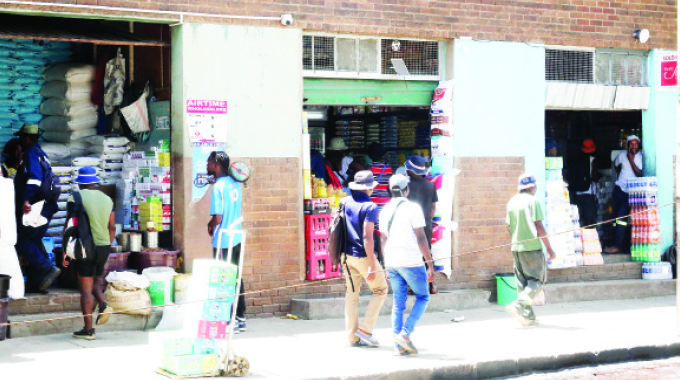Bulawayo CBD: Dynamic urban landscape or time bomb?

Peter Matika, [email protected]
Bulawayo’s majestic structures which were once symbols of architectural splendour and housed department stores are undergoing a transformation. These iconic buildings are now embracing a new identity as market villages and shared retail spaces.
However, the Bulawayo City Council (BCC) has expressed concern over the proliferation of these shops, asserting that many of them operate without proper regulation and are in violation of city by-laws.
The urban metamorphosis reflects the city’s resilience and adaptability, as it grapples with economic shifts and changing inner-city dynamics, but also poses serious health and fire risks.
Councillors recently moved a motion to deny applications by individuals or businesses seeking to subdivide their buildings, citing health risks posed by this trend as some owners are not adhering to council health standards. They said the ablution facilities in most of these buildings did not match the number of people trading in the premises.
Responding to a recent application for 37 lettable unit shops on Stand 883 Bulawayo Township by Lullabhai Investments, Councillor Susan Sithole (Ward 13) said the building had two established restaurants that were operating without running water, during a time when cholera and diarrhoea outbreaks were being recorded in the country.
“If these activities are allowed to continue, we are likely to have cholera cases being recorded in these premises,” said Clr Sithole.
Founder and managing director of Fire Prevention Zimbabwe, Mr Reggies Sibanda told Chronicle that the fire safety sector was worried over increased risk of fire outbreaks in partitioned buildings.
“You have a situation where many people are crammed in a small space and selling different wares, some of which are combustible items such as deodorant body sprays and pest repellents.
“In some cases, you find people cooking food using gas in a space that has minimum air circulation, which is very risky,” he said.

“This is a very dangerous scenario, as most of these shops do not have any fire plans. There are no fire extinguishers for any type of fire outbreak. There are no fire exits in the event of an outbreak or panic points.”
Mr Sibanda urged BCC to regularise these shops. He said fire safety measures must be put in place including well-defined escape routes.
BCC director of town planning Mr Wisdom Siziba told council that property owners intending to repurpose their buildings should first apply to BCC.
“This development permit grants the applicant authority to start development activities.
“Building plans are then submitted and then all developments made before a development permit was granted are liable to pay a regularisation fee,” he said.
Bulawayo town clerk Mr Christopher Dube said the local authority’s compliance committee should look into issues raised during the full council meeting while the council will continue to enforce the relevant by-laws.
Ward 17 Councillor Sikhululekile Moyo raised concern about the amount of money shop owners collected in rentals by the owners of the buildings while paying council peanuts.
Historic structures, including the renowned Haddon and Sly and the former FW Woolworth, stand along the city’s central avenues, their interiors now a mosaic of small-scale enterprises. The transformation is profound at the intersection of Herbert Chitepo and Leopold Takawira Streets, where the Edgars Store has shut its doors, giving way to a diverse array of retailers. Similarly, Meikles Store, a name once synonymous with departmental shopping, now hosts a market village alongside a fast-food joint and a bank.
This evolution marks the end of an era for the once-dominant department store culture that fuelled Bulawayo’s economic engine. Haddon and Sly, a cornerstone of commercial success, now faces the reality of re-purposing to adapt to the changing retail landscape.
The closure of these retail giants has paved the way for a new breed of lettable shops, now speckling the cityscape. However, not all changes have been met with admiration; some of these storied buildings now present a dishevelled appearance, overwhelmed by the frenetic pace of commerce.
As demand for prime trading locations surges, property owners are carving up their buildings, eager to capitalise on every square inch of space. This trend reflects a city in flux, embracing the hustle of modern commerce while grappling with the preservation of its architectural heritage.
Ms Barbara Ndlovu, the owner of Star Revenue Complex situated along George Silundika between 5th and 6th Avenue, said due to the retail space craze, she turned the building into a flea market.
“I converted the building from a warehouse into a flea market. I noticed that some property owners were partitioning their buildings and making more money and I followed suit,” she said.
Ms Ndlovu said she applied to BCC to re-purpose the property. “We do have the council health and safety measures that we are supposed to adhere to. For instance, we have fire exits, enough ablution facilities, and fire hazards and you don’t get a permit or licence if you don’t meet those requirements,” she said.
BL Fountain Shopping Mall, which is located near Bulawayo Central Police Station in the city centre, boasts of hundreds of cubicles that cater to small business enterprises.
The building is owned by the founder of Spirit Filled International Ministries, Apostle Lillian Bwanya. A caretaker who declined to be named said: “The vision is to have a one-stop centre that will accommodate all businesses, especially small to medium enterprises.”










Comments